January/February 2023
ISNA 2022 Scholarships
In 2022, ISNA awarded a total of $26,000 from various scholarships — Amana Mutual Funds, Abdul Munim Shakir, Hajja Razia and Plainfield Muslim Women for a Better Society — to the following individuals:
- Amana Mutual Funds ($2,500): Mohammed Lashuel
- Abdul Munim Shakir ($1,000 ea.): Adam Almaleky, Bilal Chaudary, Falak Asad, Falisha Quayum, Fatima Zaidan, Hannan Mozip, Hafsa Sheikh, Hamza Rahmoune, Heza Shahbaz, Leen Bader, Madinabonu Ashurova, Manaal Zubair, Maymuna Mohamed, Momina Shinwari, Momna Ahmed, Rana Eltahir, Taqwa Siddiqui, Zayaan Khan and Gheed Nafea
- Hajja Razia Scholarship ($1,500 ea.): Kenny Solis and Ulaa Kuziez
- Plainfield Muslim Women for a Better Society Scholarship ($500 ea.): Eshal Khan
ISNA’s scholarship committee comprises Dr. M. Affan Badar (chair), Dr. Asim Ansari, Dr. Samina Salim and
ISNA executive director Basharat Saleem. Anjum Khan helped the committee, which reviewed applicants in the Awardspring system.
George Mason University Renames Its Center for Global Islamic Studies
George Mason University announced on Sept. 29 that in recognition of a $3 million donation, it would rename its Center for Global Islamic Studies the AbuSulayman Center for Global Islamic Studies.
“This gift helps solidify the center’s position as a global resource for the study of Islam. This will advance scholarship and the public’s understanding of this global religion that touches so many,” said Mason president Gregory Washington. “The center and its relationship with the Mirza Family Foundation is a testament to Mason’s commitment to diversity of thought and its growing reputation in Islamic studies globally.”
Abdul Hamid AbuSulayman (chairman, the International Institute of Islamic Thought), an early advocate of studying Islam from a global perspective, passed away in August 2021.
M. Yaqub Mirza, Ph.D. (member, the College of Humanities and Social Sciences, the Dean’s Advisory Board and a former George Mason University Foundation trustee) said AbuSulayman was “a giant among giants” whose doctoral thesis, “Towards an Islamic Theory of International Relations” (1993), was revolutionary in its countering of the field’s traditional, Eurocentric view, which often overlooked the impact of Muslim countries and cultures.
The gift will create new community resources, produce research and support undergraduate and graduate students. Mirza said he expects the center, which is currently exploring connections with centers in Malaysia, Indonesia, Bosnia and South Africa, will become a “hub of exchange for Islamic students across the globe.”
“We want to begin trying to reflect this global Islamic studies paradigm in new international, institutional partnerships, where we begin connecting ourselves with similar centers that do Islamic studies research with a common approach in other countries around the world, including Muslim-majority ones,” said Peter Mandaville, the center’s outgoing director and Mason professor of international affairs. “These new international partnerships will enable things like exchanging faculty, students and researchers.”
Mandaville will return as the center’s director after his leave of absence.
CISNA Achieves Lead Accreditor Status with Global Accrediting Agency
The Council of Islamic Schools in North America (CISNA), the world’s largest and only Islamic accreditation organization for Islamic schools, is now the lead accreditor due to its partnership with Cognia (previously AdvancED), an international nonprofit organization that accredites schools in 90 countries.
While the accreditation standards of a state or regional agency address general areas of institutional quality, said CISNA executive director Sufia Azmat, CISNA standards address all areas through an Islamic lens and a process focused on the school’s spiritual life. CISNA standards were revised in 2020 and again in 2022 after consulting education experts. These standards are categorized under four domains — governance, school leadership, teaching & learning, and school culture & environment — that provide a systematic framework for self-evaluation and improving programs and services.
In 2011, CISNA established a partnership with AdvancED to accredit Islamic schools with an added Islamic component. It began providing accreditation services the following year. Since 2020, CISNA has been working through a rigorous standards alignment process.
CISNA announced that member schools may now apply for accreditation, follow its standards and process for their visit, and be accredited by Cognia without hosting a separate visit or responding to a different set of standards. CISNA will conduct accreditation engagement review visits and assign the team members. Cognia will no longer be involved in assigning team members, and schools won’t have to go through its training and engagement review process.
All schools meeting CISNA accreditation standards and approved by its board now automatically qualify for Cognia accreditation.
Four Muslims in DHS Faith-Based Security Advisory Council
Salam Al-Marayati (Muslim Public Affairs Council), Imam Mohamed Hagmagid Ali (director, ADAMS Center), Imam Talib Shareef (imam, Nation’s Mosque) and police department chief Issa Shahin (Dearborn, Mich.) were named to the 24-member Department of Homeland Security (DHS) Faith-Based Security Advisory Council.
Reflecting on his appointment, Al-Marayati stated, “I look forward to working with faith leaders of other communities to determine the best steps in protecting houses of worship and our communities against any form of violence. I also look forward to developing relations with these faith leaders to develop a united stand for a pluralistic democracy.”
The council will provide organizationally independent, strategic, timely, specific and actionable advice to the secretary on diverse homeland security matters. Specifically, its contributions will enhance the department’s efforts to protect houses of worship; improve coordination and information sharing of threat information with the faith community and, through the faith community, within the broader communities that they serve; increase access to DHS resources by building trust and addressing potential barriers; and prevent, protect against, respond to and recover from acts of targeted violence, terrorism and other threats.
The council’s membership, which reflects President Biden and Secretary Mayorkas’ priorities on diversity, equity and inclusion, will ensure a wide range of diverse voices across various faith traditions. The council members represent various faith communities and a diversity of denominations, as well as law enforcement.
On Sept. 24, ten months after the Naperville City Council unanimously approved plans for the Islamic Center of Naperville (ICN) mosque-complex, a groundbreaking ceremony was held. Guests included Naperville city manager Doug Krieger and several city council members. The facility is expected to be completed by October 2023.
The expanded ICN will have a 28,400 square foot mosque.
The center, which has owned the 13.3 acres of open land for about 10 years, faced opposition and rejection, especially by its neighborhood Hindu residents.
Hearings before the Planning and Zoning Commission on the proposed mosque began in January 2021. After 15 meetings held over nine months, in October 2021 the commission voted 6-1 to recommend the city council allow the center to build a mosque hall, school, multipurpose hall and gymnasium in phases over several years. Included in its recommendation were a dozen conditions seeking to appease some of the concerns about traffic, parking, occupancy, fire safety and noise raised by residents of the neighboring subdivisions.
ICN president Kashif Fakhruddin said the elders and leaders started the journey with its first center in Naperville 31 years ago.
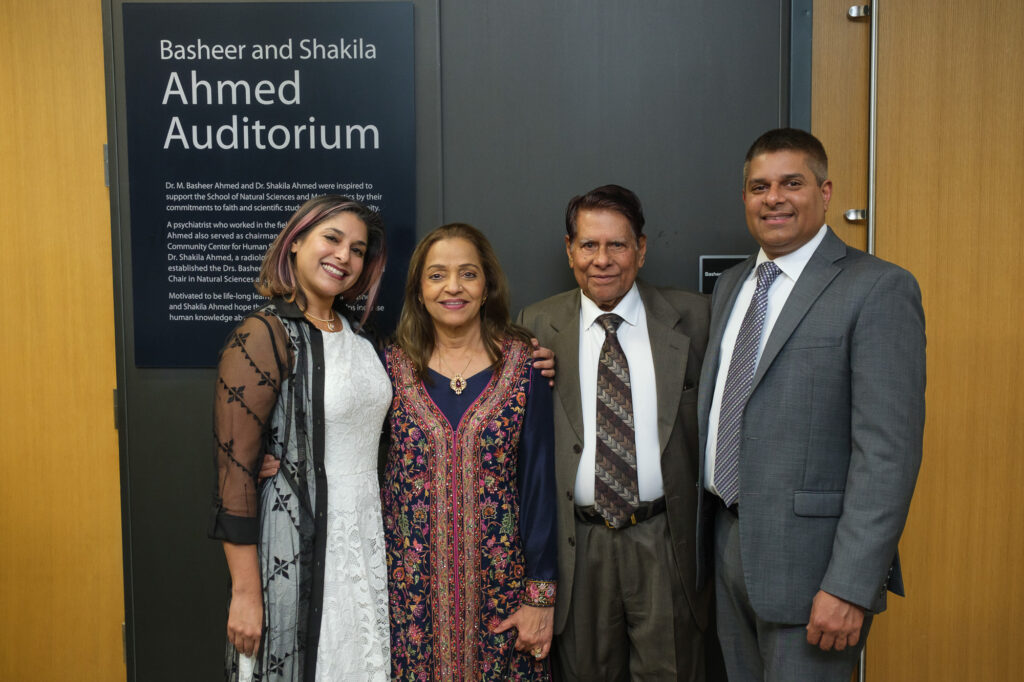
To leave a legacy to inspire generations of students, Dr. Basheer Ahmed and his wife Dr. Shakila Ahmed donated $1 million to The University of Texas at Dallas (UTD) to establish a distinguished chair in the School of Natural Sciences & Mathematics that will support its multicultural students in their studies and innovations, reported The American Muslim Today, Oct. 6, 2022.
Speaking at the Sept. 30, dedication, Basheer said, “I always had a desire to support the institutions which promote teachings of sciences and technology. Allah has given me the opportunity to accomplish this goal by supporting UT Dallas which is a great teaching institution and has a great potential to be a top-grade university.”
Basheer, a professor of psychiatry at the University of Texas Health Science Center Southwestern Medical School for several years before moving on to serve as the director of psychiatry departments in various Fort Worth hospitals, retired from the practice in 2005. He helped found the Institute of Medieval and Post-Medieval Studies, the Institute of Quranic Knowledge and Intra-Faith Religious Acceptance, as well as the Muslim Community Center for Human Services, of which he currently serves as chairman emeritus.
His wife Shakila is a board-certified radiologist.
In 1968, the couple migrated to the U.S. from Hyderabad, India.
Dane Richardson (assistant dean, School of Natural Sciences & Mathematics) said this is the first time the university has dedicated a structure to a practicing Muslim. UTD serves a significant Asian-American student population (32%) and has an international population of 17% with students from South Asia, China, Iran and Vietnam.
Azhar Azeez (CEO, Muslim Aid USA; a former ISNA president), highlighting the Ahmeds’ extensive list of organizations they have founded and their efforts to build interfaith relationships, said, “They both are shining examples of commitment, dedication and outstanding service to humanity and our beloved community. All their life they have strived to build bridges and break barriers.”
Dr. David Hyndman (dean, School of Natural Sciences & Mathematics) said the gift will fund opportunities for growth in science and mathematics, as well as enable thousands of students to engage in research.
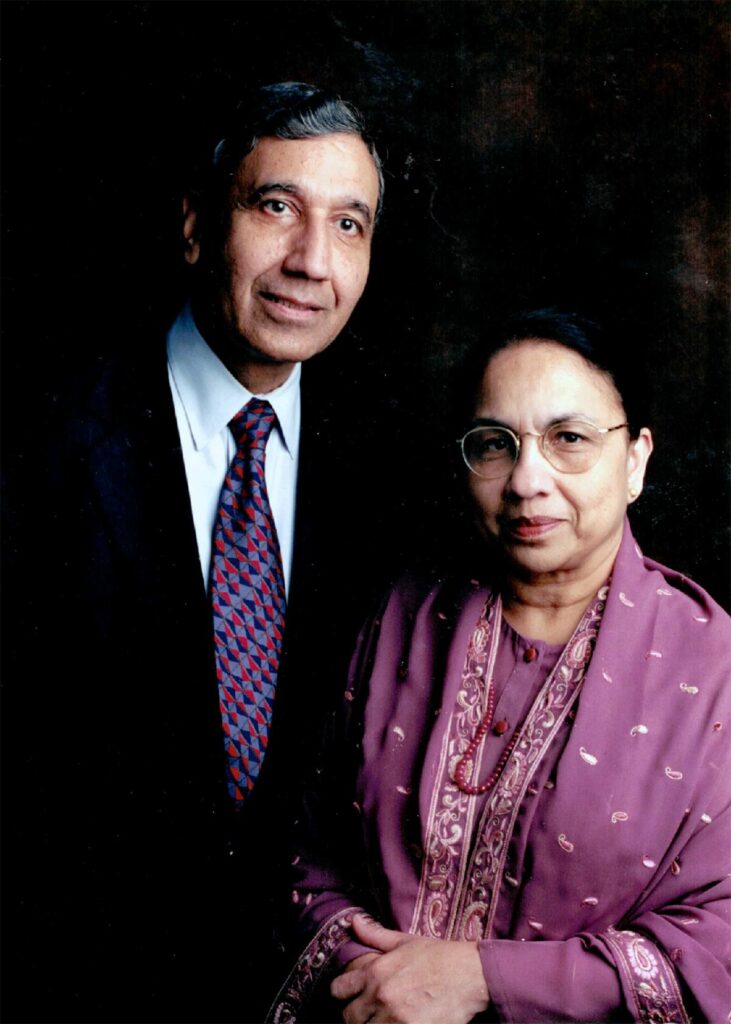
The American Islamic College announced the establishment of the Dr. Shakeela and Dr. Zia Hassan Institute for Interfaith Encounter (SZHIIE).
The institute will enable meaningful, life-changing inter- and intrareligious encounters within Chicago and beyond. The scope of its vision and activism will include research, teaching support, faculty fellowships, student internships, public lectures and workshops, community outreach, educational trips and public programs to promote transformative encounters between diverse believers and faith communities.
The Hassan Interfaith Fellowships will be an integral part of the new institute’s mission and vision.
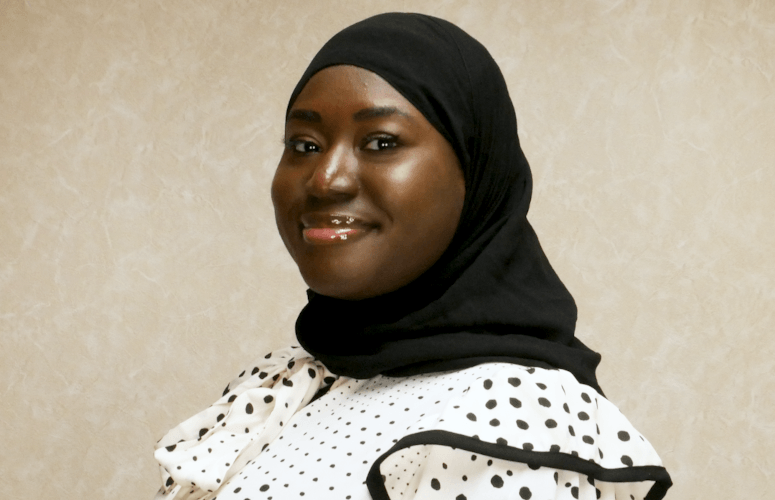
Madina P. Ouedraogo was appointed CAIR-New Jersey’s inaugural government affairs manager.
An immigrant from Burkina Faso, Ouedraogo is an alumna of New York University Robert F. Wagner Graduate School of Public Service, (M.P.A.’20) with a specialization in advocacy and political action. She’s also a graduate of The College of New Jersey School of Humanities and Social Sciences (B.A., ’18).
In a statement, she said, “As a staunch advocate for social justice and a proud Burkinabè – American, Black, Muslim woman, I am honored to utilize my skills and talents to serve my fellow Muslim brothers and sisters.
“Through my new role as the government affairs manager at CAIR-NJ, I hope to foster meaningful change for New Jersey’s diverse and vibrant Muslim umma in the political, advocacy, civic engagement, legislative and public policy arenas.”
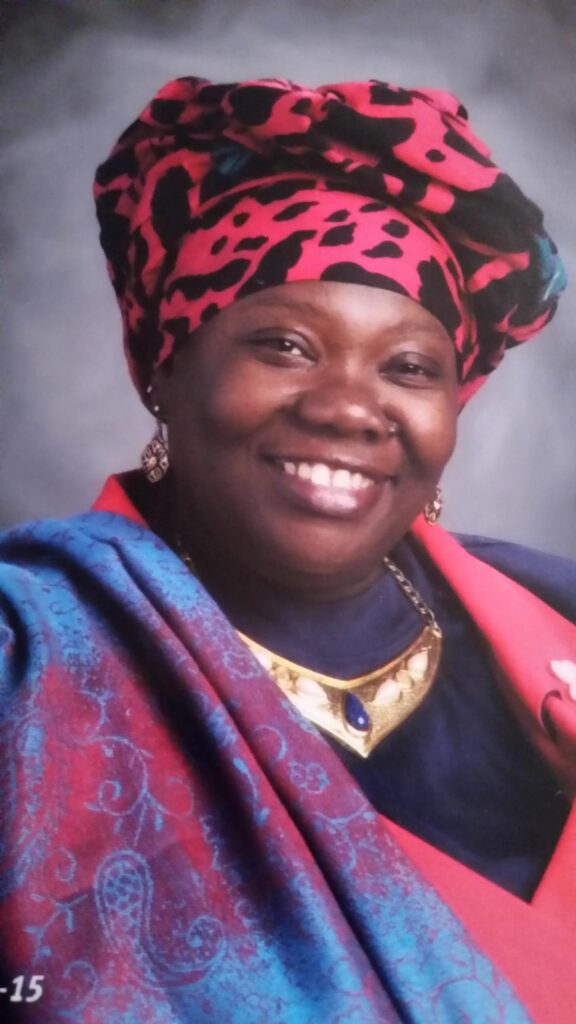
Qur’an S. Shakir, a seasoned educator, community activist, school administrator and vibrant voice in Islamic education, has joined the Islamic Schools League of America (ISLA) board.
Shakir (B.A., Georgia State University; M.A., National University; doctoral candidate, Fielding Graduate University), affectionately known as “Madame Q,” brings over 30 years of experience in education. A long-time ISLA supporter, she has been involved in many of its workshops and events. Most recently Qur’an was co-chair of its writing contest, “Celebrating African and African American Muslim History.” An Atlanta native, Madame Q is passionate about education with building strong relationships, families and communities.
A second-generation Muslim in a family with at least four generations of Muslims, she worked as an educator for more than 25 years: as a principal and earlier, as a teacher in the Mohammed Schools of Atlanta and as an educational consultant to local public and private school educators.
Shakir is helping ISLA develop its strategic plans to provide research, resources and relationships to full-time Islamic schools in North America.
Maqsood Quadri (M.S., Aligarh Muslim University, India) assumed charge at NAIT’s new executive director during October 2022.
Quadri is a familiar name in the Muslim American community, especially across Chicagoland and Illinois for his valuable contributions as a community leader.
A hydrogeologist by training, Quadri brings his multifaceted professional and management experience to NAIT. He has managed multimillion-dollar portfolios and held high-responsibility posts, solution-focused and senior management positions for 30+ years. In those positions, he delivered results and helped achieve organizational objectives by catalyzing new approaches, transforming culture and bringing the best out in team members.
Prior to joining NAIT, he was the chief operating officer at the Council of Islamic Centers of Greater Chicago (CIOGC) for four years. He also heads and sits on the boards of various prominent Islamic centers and community organizations in the U.S. and India.
Salah Obeidallah moved from executive director to president of Allied Asset Advisor (AAA) NAIT’s wholly-owned subsidiary. He remains the point person for Islamic centers’ investments through the Islamic Center Cooperative Fund.
Qadri Abdullah now leads the American Halal Institute (AHI), a wholly-owned subsidiary of NAIT, as director of operations.
Abdullah, who has spent 26 years in the food industry as a food scientist, quality manager and manufacturing plant manager, is well known among North American Muslims. Over the past 36 years he has actively served in the leadership roles and board membership of several local, national and international Islamic organizations. AHI offers a transparent and authentic halal certification, training, research and advocacy of halal goods and services.
Azam Nizamuddin, NAIT’s former chief compliance officer of AAA and deputy executive director and general counsel, has left the organization to concentrate on his political campaign in Illinois.
NAIT has moved its headquarters to 8925 S. Kostner Ave., Hometown, Ill. 60456.
On Oct. 29, after years of overcoming legal challenges and governmental hurdles, members of the Islamic Life Center in Carmel, Ind., broke ground for their mosque.
Nadeem Ikhlaque, Al Salam’s founding president, along with mayor Jim Brainard (R), Rep. Victoria Spartz (R) and Pastor (ret.) Jerry Zehr of Carmel Christian Church and a founder of the Carmel Interfaith Alliance, attended the ceremony.
U.S. Rep. André Carson (D) and state Sen. Fady Qaddoura (D) spoke at the joyous community event.
Located on a 15-acre site, the Center will feature a minaret, a prayer area, classrooms, office space, a gymnasium and a kitchen. Faisal Khan, a board member of the Al Salam Foundation, said that construction will take place over the next two years. The grand opening is planned for late 2024.
After years of resistance and litigation with the city, on Oct. 28 DeSoto County’s (Miss.) first mosque broke ground.
The Abraham House of God started as a vision between two friends who have been working since 2019 to get the mosque built in Horn Lake, Miss.
“We were talking about we needed a mosque or facility for us to go and practice our faith,” said founder Riyadh Elkhayyat, who said it’s been an unexpected journey to get to this point.
“I was so shocked and surprised [by the opposition], because this is my community. I was shocked that these people were so biased against Muslims. It has to be [the case]. There are churches wherever we are building our mosque.”
Finally, Elkhayyat got legal representation from the American Civil Liberties Union of Mississippi, and they sued the city for discrimination.
“It’s very historic because that would be the first mosque in north Mississippi. I think it’s historic for all the Muslim community in that region,” Elkhayyat told News3, WREG, Memphis.
The mosque is expected to be completed in about a year.
Anwar Khan (president and founder, OBAT Helpers), participated in the Muslim Philanthropists Mini-Summit (MPMS) at the Vatican in October. This October summit, part of the inaugural “Faith and Philanthropy Summit,” was organized by the Galileo Foundation in partnership with the Global Compact on Education (GCE), the World Congress of Muslim Philanthropists (WCMP), the Jewish Funders Network (JFN), the Lilly Family School of Philanthropy and UBS AG. It brought together 145 of the world’s leading philanthropists from five different faiths. The MPMS, held in conjunction with the Faith & Philanthropy Summit, was co-hosted by the Galileo Foundation, the WCMP and the Lilly Family School of Philanthropy’s Muslim Philanthropy Initiative (MPI).
“Pope Francis hopes that this convening will inspire new philanthropic partnerships across traditional faith lines, to tackle some of the world’s most pressing challenges in the areas of education, global health and sustainability in the service of the entire human family,” said the Galileo Foundation. The Vatican’s GCE, the WCMP, Lilly Family School of Philanthropy, JFN, as well as UBS, worked toward launching the new Human Family Fund, which will provide capital for new interfaith partnership projects to deliver opportunity and equality for the world’s most marginalized. During the summit with leading philanthropists Jeff Bezos and Laura Turner Seydel were brought together with key religious leaders including the Pope’s secretary of state.
Participants in the Muslim philanthropists’ mini summit discussed the role of philanthropy, current obstacles to human well-being and how philanthropy can impede those obstacles and result in a better future for everyone. Other topics discussed included the role of Islam, theology and religious practice in philanthropy. The discussion will culminate in an MPI-published white paper.
ACHIEVERS
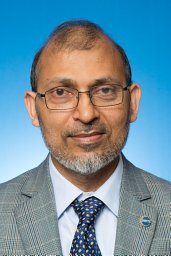
M. Affan Badar, PhD, CPEM, IEOM fellow, ISNA secretary and board member, was named associate editor of the Engineering Management Journal (EMJ) on Oct. 20, 2022.
This official journal of the American Society for Engineering Management (https://www.asem.org), is published by Taylor & Francis Group, London and indexed in Web of Science (Clarivate) and SCOPUS. In 2021, its impact factor was 2.548.
Badar, who has been employed at Indiana State University (ISU) since 2002 and is currently a tenured professor in its Applied Engineering and Technology Management Department and interim director its doctoral program in Technology Management, has an impressive career of service: professor and chair, Industrial Engineering & Engineering Management Department, University of Sharjah (2016-18; on leave of absence from ISU); an ISU interim associate dean of the ISU College of Technology (2014-15), AETM department chair (2010-14) and program coordinator (2007-10) and a member of the University Faculty Senate and College Faculty Council.
In addition, he is an ABET/ETAC commissioner who started as a program evaluator (EAC and ETAC) in 2010. He has published over 85 articles on reliability, quality, lean manufacturing, coordinate manufacturing, design and supply chain; secured over $1M funding from NSF, other agencies and industries; and served as editor-in-chief or for International Journal of Forensic Engineering & Management, editor of the journal Advances in Mechanical Engr, associate editor and editorial board member of several journals, among them the Int. J. of Quality & Reliability Mgt and NED Univ. J. of Research: App Sciences; and reviewer for various journals and conferences.
Selected in the 2022 IEOM Academy of Fellows, his name will be announced as a new fellow at the organization’s annual conference in Istanbul on March 7-10, 2022.
The Fellow distinction is the highest level of membership to recognize an individual’s contribution to industrial engineering and operations management. Fellows have distinguished themselves by conducting theoretical and applied research, implemented proven industrial engineering and operations management tools, improved the productivity of manufacturing and service industries, and created jobs and career opportunities for the betterment of humanity.
These individuals are expected to represent their profession and the IEOM Society, advise the IEOM Board of Directors, use their professional experience and skills to promote industrial engineering and operations management, as well as propose and lead strategic objectives that could increase membership and recognition of the organization and its members worldwide.
Badar (B.Sc. [Hons], industrial engineering, 1988, Aligarh Muslim University [India]; M.Sc.; industrial engineering 1990; MS, mechanical engineering, King Fahd University of Petroleum and Minerals, 1993, Saudi Arabia; and Ph.D., industrial engineering, 2002, University of Oklahoma) has published one edited book and two book chapters, as well as 80+ articles in refereed journals and proceedings on lean manufacturing, quality, reliability, engineering economy, healthcare and supply chain. He has received funding from, among other institutions, the National Science Foundation, Indiana Campus Compact, the Small Business Administration, ISU (Lilly Foundation), NATO, Union Hospital, Columbia House and Tredegar Film Products.
His co-authored proceedings papers received the Best Track Paper Award at the IEOM conferences in 2021 and 2020, and his co-authored journal paper was selected as a Highly Commended paper by the International Journal of Quality & Reliability Management in 2017. He received IEOM’s Teaching Excellence award at its 2020 conference in 2020 and was recognized with its Outstanding Service award and Outstanding Contribution award at its 2021 and 2020 conferences, respectively. He received the Albert Nelson Marquis Lifetime Achievement award in 2017 and Epsilon Pi Tau’s Warner Professional Practice award in 2015.
In addition to all of this, he has found time to organize several national and international conferences in the capacity of program, track, or technical chair and organizing committee member. He is chairman of Salfia Paramedical Institute (India); served on the Operations Management Board of India’s Jahangirabad Inst of Technology (2014-18); been a member of IISE, IEOM, ASEM and ASEE; president of AMSET (2016-17); vice president of the ATMAE Manufacturing Division (2012-17); a member on the Board of Directors of the IISE Engineering Economy Division (EED) (2012-14) and director of EED (2005-07).
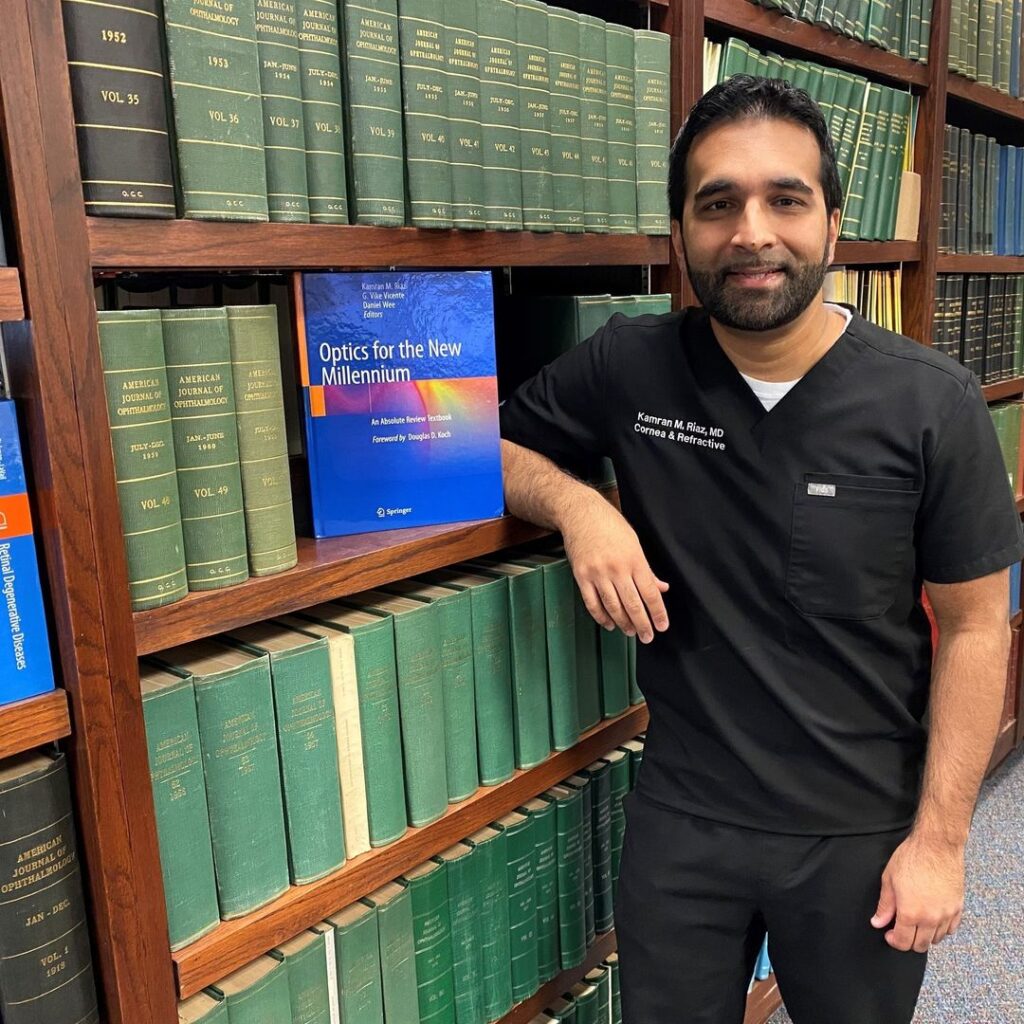
Kamran M. Riaz, M.D. has published a textbook, “Optics for the New Millennium: An Absolute Review Handbook of Clinical, Surgical and Testable Relevance,” coauthored with G. Vike Vicente and Daniel Wee (Springer Publishing, 2022).
Earlier in January, he published “A Clinical Atlas of Anterior Segment Optical Coherence Tomography” (SLACK Publishing) with B. Levinson and F. Woreta
Riaz (B.A., University of Illinois at Chicago, ’03; M.D., University of Illinois at Chicago, ’08; Phi Beta Kappa honor society), who memorized the Quran before high school, is a clinical associate professor at the University of Oklahoma’s Dean McGee Eye Institute.
Among his honors are “Top Doctors List 2022” (405 Magazine, January 2022), “Achievers Under 40, Class XVII” (The Journal Record, August 2021) and “40 Under 40, Class of 2021” (Oklahoma Magazine, March 2021).
He and his physician wife Sanaa have three children. He is fluent in Spanish, Urdu and Arabic.
CAIR recognized Ohio student athlete and activist Noor Abukaram as its American Muslim of the Year at its 28th annual banquet on Oct. 29.
Abukaram was an athlete on the cross-country running team at Ohio’s Sylvania Northview High School in October 2019 when she was disqualified from her track meet for wearing the hijab. She worked with Ohio senator Theresa Gavarone (R) to write Senate Bill 288, which prohibits schools and interscholastic organizations from adopting rules that ban the wearing of religious apparel during athletic events. Ohio Governor Mike DeWine (R) signed the bill into law.
Abukaram’s story has inspired nationwide efforts to protect the right to wear religious clothing in athletics.
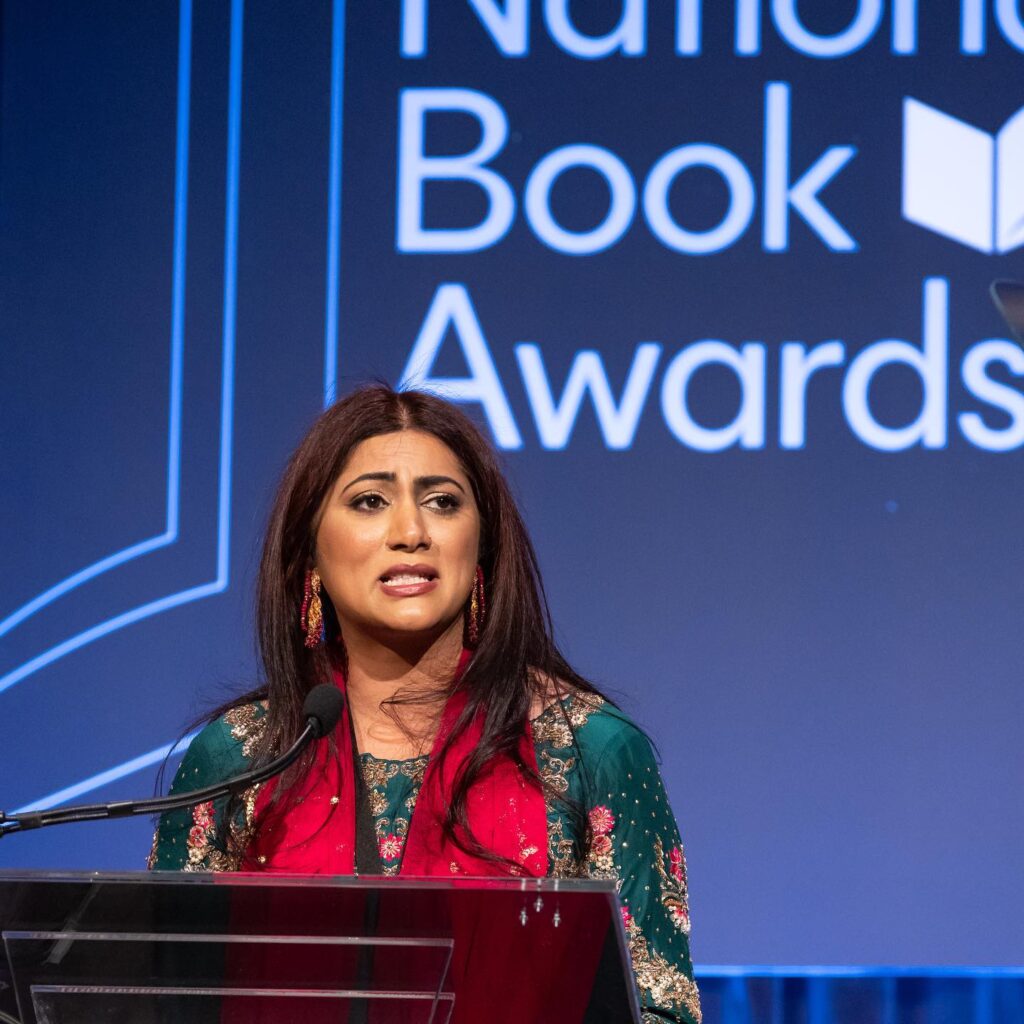
Sabaa Tahir a young adults novelist best known for her New York Times-bestselling “An Ember in the Ashes,” its sequels and the novel “All My Rage,” became the first Muslim American to win the National Book Award for Young People’s Literature.
These two novels were listed among Time Magazine’s 100 Best Fantasy Books of All Time in 2020. In 2022, “All My Rage” won the 2022 Boston Globe–Horn Book Award and the National Book Award for Young People’s Literature.
Tahir, who lives in the San Francisco Bay Area, has also published non-fiction reviews and essays in The New York Times, The Washington Post and Vox, during which time she interned at The Washington Post. After graduation, she took a job there as a copy editor.
Tell us what you thought by joining our Facebook community. You can also send comments and story pitches to [email protected]. Islamic Horizons does not publish unsolicited material.
